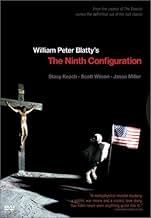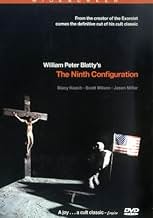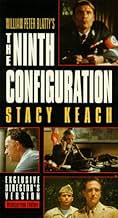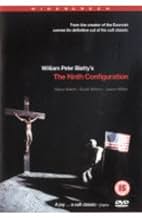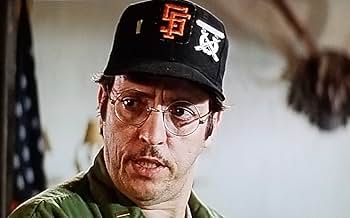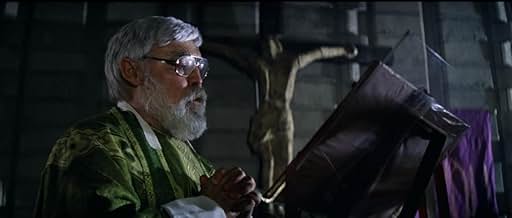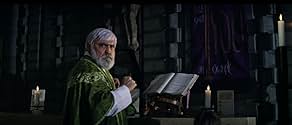An ex-marine psychiatrist attempts to rehabilitate his patients by indulging their fantasies, and seeks to prove the existence of a loving God to one especially troubled inmate.An ex-marine psychiatrist attempts to rehabilitate his patients by indulging their fantasies, and seeks to prove the existence of a loving God to one especially troubled inmate.An ex-marine psychiatrist attempts to rehabilitate his patients by indulging their fantasies, and seeks to prove the existence of a loving God to one especially troubled inmate.
- Awards
- 3 wins & 4 nominations total
Featured reviews
The spectacular direction, acting and cinematography cannot, in my mind, completely compensate for the implausibility of the plot reveal, which occurs about 2/3 of the way. That implausibility, at least as presented, distracts in turn from the treatment of the serious existential questions the film asks because after the reveal, events to make the movie's point seem contrived to be "just so".
Evidently, the expression "ninth configuration" is supposed to refer to the improbability of proteins randomly rearranging themselves to give rise to life. An astronomically small number is mentioned,and compared unfavorably to the probability for the existence of God, but I must admit that, as a scientist, I had never heard this term before. Nor does it seem to me that anyone could seriously calculate the probability of life arising on earth, given that the sample size of planets where this is known to have occurred is exactly one (there is something called the Drake equation for estimating the number of alien civilizations, which requires estimates for the probability of life in other worlds, but there are too many unknowns to make it possible to perform a serious calculation).
I have found that theological arguments are sometimes dressed up in mystical-sounding mumbo jumbo, and can't escape the suspicion that this might be the case here, too. However, that does not diminish the importance of the question itself of how life could have arisen.
The main philosophical question this films asks, however, is this: if we are really just a collection of atoms, perpetuating a phenomenon involving proteins which originated in an incredibly improbable random event long ago, then whence comes goodness?
The premise behind the question is strongly reductionist: for example, we have at least some biology-based frameworks for understanding altruism in higher organisms, and even if some proteins may play a role in these, the behavior of atoms at that level has long faded into explanatory irrelevance.
The movie is idiosyncratic and plays really well with our expectations. There is a hilarious scene in the beginning involving a short exchange between the protagonist and the man himself, which both foreshadows events to come, and sets us up to question what is real and what is not.
Scene after scene, we are sprayed with rhetorical snippets and actions by the mental patients (and even the attending physician) which seem nonsensical, but then, every once in while, there is follow-up dialogue which makes clear that what we thought was nonsense actually makes perfect sense.
No doubt Blatty did all this to disorient us, the audience. I can only speculate, but I suspect he sought to achieve a state of disorientation in the audience because it is, in a way, the best possible state to be in when asking the most fundamental questions: since we are not certain of anything, we cannot attach ourselves with certainty to any side of the debate.
And not taking sides is nowhere more important than when we try to really get to the bottom of things.
If my speculation is correct, then the set-up is nothing short of a stroke of genius. It makes how the aforementioned plot-reveal was handled all the more disappointing.
My problem is that an impossibly far-fetched set of events is presented to us straight. If, instead, it had taken the movie, say, in a surreal direction, then it would not have cheapened the film's attempts to provide an answer to the main question. As presented, it makes the final sacrifice, and especially the very last scene, seem like plot devices which betray that the author has, after all, taken sides.
Despite this criticism, CONFIGURATION is an impressive debut.
Films with similar elements:
1. ONE FLEW OVER THE CUCKOO'S NEST (1975)
2. AMARCORD (1975)
3. KING OF HEARTS (1966)
But I watched this movie. Then I rewound it and watched it again. Over the next three days, I watched and rewatched every frame of this masterpiece more times than I should publicly admit. I was moved beyond words, beyond being an audience. I became a disciple--even a proselyte--for this film. Stacy Keach completely astounded me, someone who knew him only as Mike Hammer. People, this man can ACT. I saw every demon his Colonel Kane carried with him. The rest of the cast, with a special metion for Scott Wilson's amazing performance as a tortured astronaut and for Ed Flanders, who kept his character's true motivation well hidden until it could stand to be covered no more, was perfect.
But this movie is, above all, about the writing and the direction. William Peter Blatty cared about his project, and the lucky few (sadly, VERY few) of us who shared in it were fortunate enough to see cinematic perfection virtually attained. Watch this film, let it develop, don't question where its motives are until it decides to let you in on them. Give it your full attention, and you will be rewarded with a treat we so tragically, rarely get to have. No special effects, no huge budget. Just artistry. Pure, refined artistry.
This is a strange film that'll cause you to think (if you don't enjoy these type of films then I suggest you look elsewhere). An interesting movie about things that aren't as they seem, soul searching and seeking redemption through honor and self sacrifice. I liked the way these people have to look into themselves and see who or what they really are. I wished that William Peter Blatty made more movies and Hollywood should have gave Stacy Keach more film roles like these. He was quite impressive.
I have to to highly recommend this movie. But if you're expecting some mainstream popcorn nonsense then look elsewhere.
William Peter Blatty wrote 'The Exorcist' as the first part of a trilogy of novels, the other installments being 'Twinkle twinkle killer Kane' and 'Legion'. 'Twinkle twinkle killer Kane' was adapted to the screen by Blatty as 'The Ninth Configuration' and where 'The Exorcist' explored the argument for the existence of God through the palpable presence of evil, 'The Ninth Configuration' continues the argument through exploring the presence of good in a universe purported by science to be empty, blindly deterministic, and amoral.
At the start of the film we are introduced to a motley band of members of the military who, in the course of the Vietnam War, have all suffered various kinds of mental breakdown and for their treatment have been sent to a reconstructed European castle in some remote American mountains (the film was actually shot in Hungary). Chief among these is the astronaut Capt. Billy Cutshaw (Scott Wilson) whose illness is seen as somehow key in that it is clearly not feigned due to cowardice as he was never scheduled for combat. This introduction sets the tone for the first part of the film and the portrayal of mental illness is somewhat zany and comedic and continues as we are introduced to the other main character, the psychiatrist Colonel Kane (Stacy Keach). Col. Kane, with the support of fellow psychiatrist Col. Fell (Ed Flanders), then institutes an unorthodox treatment which indulges the fantasies of the inmates in an attempt to invoke a catharsis which is when all (comedic) hell breaks loose and it is against this anarchic backdrop that Cutshaw argues with Kane for the absurdity of believing in God in a world in which undue suffering proliferates.
The light-hearted whacky tone gives way in the second half as Kane and Cutshaw's arguments become more penetrating (although not completely, as Cutshaw's choice of wardrobe to a Christian Mass will testify!) and the climax of the film is a double-whammy of a plot reveal that casts the performance of Ed Flanders as Col. Fell in a pathos infused light (which can only be fully appreciated with repeat viewings), as well as a bar room fight that will have you stuck to your screen as the tension builds and builds to an explosive finale.
Unfortunately, owing to the fact that a theological tragi-comedy is not the stuff the popcorn and soda crowd really go for, 'The Ninth Configuration' has fallen into the "cult" film category, which is a shame as another film with as fine a plot carried off by as fine a cast (not to mention a wealth of quotable one-liners) you are unlikely to see. However, while the film clearly deserves wider recognition (especially given it's conceptual relationship to 'The Exorcist'), those that seek it out, or fortuitously stumble upon it , are in for a real treat!
Did you know
- TriviaJoe Spinell's character of "Spinell", a patient at the castle-hospital, was not in the novel nor the original script. Spinell had begged writer and director William Peter Blatty, a close friend of his, to cast him in a small role as the sidekick to Jason Miller's character of Lieutenant Reno. Since there was no part for Spinell in the movie, his character was given the same last name. Nearly all of Spinell's dialogue was ad-libbed.
- GoofsWhen Capt. Cutshaw places the mud pie on Col. Kane's desk it is whole and intact. In the next shot the mud pie is very noticeably crumbled.
- Quotes
Col. Vincent Kane: In order for life to have appeared spontaneously on earth, there first had to be hundreds of millions of protein molecules of the ninth configuration. But given the size of the planet Earth, do you know how long it would have taken for just one of these protein molecules to appear entirely by chance? Roughly ten to the two hundred and forty-third power billions of years. And I find that far, far more fantastic than simply believing in God.
- Alternate versionsThere are five different versions of this film, with various running times from 99 up to 140 minutes. Director William Peter Blatty disowned all versions except one: his approved cut runs 118 minutes and is the version that was originally released theatrically in the USA. This version is available on DVD.
- ConnectionsFeatured in Night of the Creeps: Tom Atkins, Man of Action (2009)
- SoundtracksThere's a Rainbow 'Round My Shoulder
Written by Al Jolson (uncredited), Billy Rose (uncredited) and Dave Dreyer (uncredited)
Performed by Al Jolson
Courtesy of MCA Records
- How long is The Ninth Configuration?Powered by Alexa
Details
- Release date
- Country of origin
- Language
- Also known as
- La Neuvième Configuration
- Filming locations
- Castle Eltz, Wierschem, Rhineland-Palatinate, Germany(exteriors of the castle)
- Production company
- See more company credits at IMDbPro
- Runtime1 hour 58 minutes
- Color
- Aspect ratio
- 2.35 : 1

